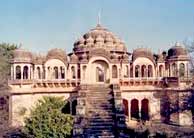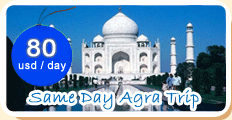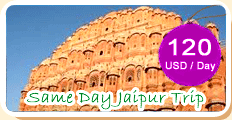
Shekhawati Tour

 This is a semi desert region in north Rajasthan and it is situated entirely in the triangle between Delhi-Bikaner-Jaipur. Shekhawati is a region and not just a town or fort; it takes its name after its ruler Rao Shekha. Shekhawati means the garden of Shekha.
This is a semi desert region in north Rajasthan and it is situated entirely in the triangle between Delhi-Bikaner-Jaipur. Shekhawati is a region and not just a town or fort; it takes its name after its ruler Rao Shekha. Shekhawati means the garden of Shekha. The towns of Shekhawati are eminent for their amazing painted havelis. Such is the appeal of the havelis that this region is dubbed as "open art gallery of Rajasthan". The plethora of painted Havelis in rich artistic tradition makes it commendable and fascinating. Most of the buildings are dated from 18th century to early 20th century. The Shekhawati landscape is dotted with so many havelis that tracking them is something like a treasure hunt. Various forms of fine art adorn the walls and the ceilings of these structures, complimenting the otherwise flat and barren land. The havelis are noted for their frescos depicting mythological themes and that of huge
animals. Some later day frescos shows the arrival of the British and highlighting steam locomotives and train doubtlessly for the benefit of those members of the household who did not travel to distance places by train or see this newly introduced mode of transport.
Nawalgarh
Founded in the 18th Century by Nawal Singh, it has some of the finest frescos in the Shekhawati region. A huge fort with colourful bazaar and numerous havelis with elaborate architecture makes it an interesting destination for a 1day / 1 night stay. There are a few prominent havelis like Anandilal Poddar Haveli, Aath Haveli, Hodh Raj Patodia Haveli etc., which are to be visited, and so are the two forts and the palace hotel Roop Niwas that is a beautiful heritage property and is renovated with modern facilities. The Palace offers spacious painted rooms, Luxurious interiors, graceful hospitality and great thematic evenings with sumptuous cuisine.
Nawalgarh Havelies
On the west of the fort are a group of havelis know numerically as aath havelis, aath meaning eight. The frescos on these havelis are not the best examples but they show the transition in painting styles through the periods. One of the paintings depicts a steam locomotive while other show mammoth images of elephants, horses and camels. Opposite these havelis is situated the Muraraka Haveli, which shows off some very fine painting including the miniature paintings from the Krishna legends. The haveli is has no occupants and the courtyard is usually locked unless some function is taking place. To the north is Hem Raj Kulwal Haveli. Built in 1931 the haveli depicts at the entrance portraits of the Kulwal family and also that Indian leaders like Gandhi and Nehru. The windows are bordered by very colourful
architraves. An ornate silver gate leads to the inner courtyard, which has some fine paintings mostly of religious themes. A local caretaker will let you in for a small tip. Quite close to it is the Khedwal Bhawan, which features some striking mirror and blue tile work at the entrance to the inner courtyard. Some frescos depicting a locomotive engine crossing a bridge and a woman on a swing in festivities of Teej Festival are seen on some of the walls.
Also seen is the story of legendary lovers Dhola Maru on an outside wall. Morarka Haveli, which thrown open its doors to public only recently charges Rs 75 for entrance. The haveli displays some very well preserved paintings of Ramayana legends. Other notable havelis are Bhagton ki choti Haveli, Parusrampuria Haveli, Dharni Dhakra Haveli, Chhauchharia Haveli, Hira Lal Sarowgi Haveli and Geevrajka Haveli.
DUNDLOD
This Thikana (destination) is in the heart of Shekhawati Region, founded in 1750 and about 7 km from Nawalgarh the fort is a blend of the Rajput and Mughal Art and architecture the Diwan- e- khas (Hall of private Audience) has stained glass windows, find antiques and an impressive library.
The zenana quarters are on the 1st floor featuring exquisite decors and furniture. The fort is converted into a cosy and comfortable abode. The dress code of the state and grand hospitality with the horse guards are an attractive factor. The Goenka Haveli is worth a visit for the beautiful frescos and the fine mirror work above the windows and features of Florets and birds in the outer courtyard. There are better-preserved paintings in few other havelis and chattris. A peep into the village on a camel safari is rather interesting. A fine breed of horses has been a passion with the family ancestors and continues till this time by their descendent. These royal studs are available for riding and horse safari. A 1 day and 1 night stay over at the resort envelopes you with the nostalgia of their classic life-style that is complimented by the formal hospitality and entertainment. The thikana Kansamas (chefs) doles out with delicious cuisines for the taste buds.
Mandawa
Founded in the mid 18th century Manawa skyline today is dominated by an imposing mirage like fort now a heritage hotel that is maintained in the classic medieval theme with the modern luxuries. The painted archway is painted with interesting forms of paintings of Lord Krishna and his cowherds. The sprawling architecture houses a different theme in different wings. The spacious rooms are adorned by intricate interior wall paintings and mirror work with open terrace that offers a panoramic view of the whole town. The women folks of the Mandawa family who lived in a royal style once used this floor. The ambiences of those years still linger around the rooms. The Mandawa family has a unique collection of their preserved paintings and antiques that adorn the main huge hall in the centre of the castle,
originally the durbar hall and now an exotic lounge. The ceremonial costumes of the family collection and the precious arms with handle of jade and beautiful curios brought by the British as a gift for the nobles are well placed like a showcase of a museum. The hotel is well equipped with modern facilities in an ethnic set-up. A night stay is an experience in itself with thematic evenings and oriented and medieval cuisine. The warm hospitality is touching.
Salasar Balaji
In the Churu district and 2hrs drive from Fatehpur, the great famous temple of SANKATMOCHAN HANUMAN is situated. Salasar Balaji is situated in the small town called Salasar. The holy temple requires no introduction to Hindus all over the world. It has a trail of devotees that cannot be numbered. The history of this temple dates back to 1811 in a village called Asota, where a farmer while ploughing his field, got stuck by some rock under the earth and when cleared by his wife, emerged an idol of Lord Hanuman. The Thakur of that village dreamt being asked to shift the idol of Salasar for proper religious incarnation. At the same time a devotee worshiper of Lord Hanuman called Mean Das also dreamt about the Lord and was asked to do the same. The idol was thus sent to Salasar with all care and
devotion. Transforming the village into the Salasar Dham, initially a hut, the place was later developed gradually into a concrete temple, which now has a large complex. All that the devotees desire is fulfilled by Lord BALAJI, lacs of followers from all over the world visit this holy place every year.
Khatushyam Ji
The legend of this immensely popular Krishna temple can be traced back to the medieval Mahabharat where, Barbareek the son of great Pandav brother Bhim and Nag Kanya (snake princess) displayed his great warrior skills that pleased Lord Shiva who endowed his blessings in the form of Teen Ban (three arrows) and Agni Dev (fire god ) gave him a bow, so that he could conquer all the three worlds. In order to watch the famous war of Mahabharat he sat towards the battle field and in between his tryst with a Lord Krishna in disguise become a vital part of the history and thus the incarnation of KHATU SHYAMJI. The lord asked the young Barbareek to sacrifice his head for charity, because otherwise the victory of pandavas would not be possible since he possessed the Teen Bans. The boy maintained his promise of
Sheesh Dan as a true Kshatriya but at the same time wished to watch the war and his wish was granted. Later on, his head was buried in Khatu where the king had a dream and was inspired to construct a temple and place the head in a religious manner. Till this date his devotees are blessed by just pronouncing his name from the bottom of their heart with true Samarpan. The devotees from all around the world visit this pilgrimage temple at the time of the mela in the Kartik month. Their devotion and belief simply pours from their conscious belief. The temple today is run by trust and the offerings of the devotees is for the Kripa which the god bestows on his devotees.
Maa Shakhambhari
The famous temple of Maa Bhagwati Shakambhari, also known as Sakarai Mata, is situated in Sikar district of Shekhawati region. The temple lies 56 K.M. east of Sikar amidst the green valley of Arawalis.
From Udaipurwati village of Sikar district the famous temple lies 16 K.M. and an approachable road is available to reach the temple. Buses are available from Udaipurwati. Shakambhari is also connected with Delhi, Jaipur, Jhunjhunu, Sikar, Bikaner, Nawalgarh and other important villages of Shekhawati region. The place is famous for its sacred temple built in 7th centaury. And it is one of the eight SHAKTI PEETHS in India.
In the green, lonely & calm velley of Maalketu, (the Arawali hills)the magnificent temple is located surrounded by varieties of trees like dho, plash, senana, kirwala, kankun, gangeran, falsa, petal, neem etc. and lot of herbal trees.
The famous river SHANKAR GANGA flows near the temple in rainy season and many ghats have been created in which the pilgrim take a holy deep.
There are a lot of dharamshalas, built by the seths (Merchants) of the Shekhawati region near the temple where the pilgrims can stay.
The other religious places, near the temple, are Jata Shanker Temple, Shri Aatm Muni Ashram etc. The pilgrims come to the temple round the year, however, in the month of MAAH, 8th, 9th & 10th day of the month are marked as special pray of Goddess Bhagwati, During this period lot of pilgrims come here. In NAV RATRA time, a nine day long Nav Ratra Festival is held here in the month of Chaitra & Aashose.
























